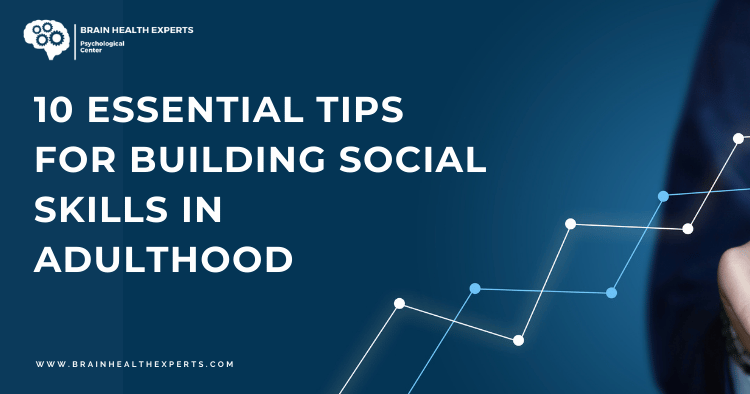“Building social skills is a journey, not a destination. Embrace every step along the way.”
Building social skills as an adult can feel daunting, especially if you didn’t prioritize them in your earlier years. However, it’s never too late to develop these vital skills that can enhance both your personal and professional relationships. Below, we delve into ten essential tips for building social skills in adulthood, along with answers to common questions.
Why Are Social Skills Important?
Social skills are essential for various aspects of life, from forging personal relationships to succeeding in your career. They help you communicate effectively, resolve conflicts, and build rapport with others.
“Strong social skills can lead to better mental health, intimacy in relationships, and increased job satisfaction.” – American Psychological Association
According to the American Psychological Association, strong social skills can lead to better mental health, intimacy in relationships, and increased job satisfaction. Furthermore, enhancing your social skills can significantly boost your emotional well-being, as discussed in 10 ways positive thinking boosts emotional well-being.
1. Practice Active Listening
Active listening is more than just hearing words; it involves fully engaging with the speaker. Here’s how you can practice:
- Maintain Eye Contact: Show your interest and attentiveness.
- Nod and Respond: Use non-verbal cues and verbal affirmations like “I see” or “That makes sense.”
- Summarize: After someone has finished speaking, summarize what you understood. This shows that you were paying attention and provides clarity.
“Active listening improves your relationships significantly, making the other person feel valued and understood.”
Active listening improves your relationships significantly, making the other person feel valued and understood. Additionally, practicing empathy, as noted in 7 ways empathy boost your emotional intelligence today, can also enhance your active listening skills.
2. Engage in Small Talk
Small talk might seem trivial, but it’s a vital stepping stone to deeper conversations. Here are some tips to get started:
- Ask Open-Ended Questions: Instead of yes/no questions, try questions like “What do you enjoy doing in your free time?”
- Share Your Thoughts: Small talk is a two-way street; share your opinions to encourage dialogue.
- Be Mindful of Body Language: Your body language should reflect openness—avoid crossed arms and look approachable.
“Mastering small talk can lead to more significant conversations and connections.”
Mastering small talk can lead to more significant conversations and connections. For more on building interpersonal connections, check out 10 essential tips for building trust in relationships.
3. Join Clubs or Groups
Joining clubs or groups that match your interests is a fantastic way to meet new people. Here’s why:
- Shared Interests: You’ll have an instant conversation starter.
- Regular Interaction: Frequent meetings allow relationships to develop naturally.
- Skill Development: These settings often provide opportunities to practice and improve your social skills.
“Consider checking out platforms like Meetup to find local groups and engage with like-minded individuals.”
Consider checking out platforms like Meetup to find local groups and engage with like-minded individuals.
4. Attend Workshops or Classes
Participating in workshops or classes can help you build social skills in a structured environment. Here’s how:
- Structured Learning: Classes often focus on specific skills, giving you clear objectives.
- Networking Opportunities: You’ll meet others with similar interests, which can lead to new friendships.
- Feedback from Instructors: Instructors can provide valuable feedback on your social interactions.
“Look for local workshops on platforms like Eventbrite to find opportunities that suit your interests.”
Look for local workshops on platforms like Eventbrite to find opportunities that suit your interests.
5. Volunteer for Community Service
Volunteering is a powerful way to develop social skills while giving back to the community. Benefits include:
- Meeting New People: You’ll work alongside diverse individuals who share a common goal.
- Teamwork: Volunteering often involves collaboration, enhancing your teamwork skills.
- Increased Confidence: Helping others can boost your self-esteem and social confidence.
“Consider local organizations or explore opportunities on VolunteerMatch.”
Consider local organizations or explore opportunities on VolunteerMatch.
6. Use Social Media Wisely
Social media can be a double-edged sword. Use it wisely to build social skills by:
- Engaging in Conversations: Comment on posts and participate in discussions.
- Joining Groups: Online communities can help you connect with like-minded individuals.
- Practicing Communication: Social media allows you to express your thoughts and ideas in a low-pressure environment.
“Just remember to balance your online and offline interactions!”
Just remember to balance your online and offline interactions! You can also explore 10 effective strategies to enhance workplace mental health to understand how social media can affect professional relationships.
7. Seek Feedback from Friends
Feedback can be a valuable tool for improvement. Here’s how to gather it effectively:
- Ask Specific Questions: Instead of vague inquiries, ask for feedback on particular situations.
- Be Open to Criticism: Accept constructive criticism graciously and see it as an opportunity to grow.
- Thank Your Friends: Show appreciation for their insights, reinforcing your bond.
“This practice can enhance your social interactions and help you identify areas for improvement.”
This practice can enhance your social interactions and help you identify areas for improvement.
8. Read Books on Social Skills
Books can provide insights and strategies for improving social skills. Here are a few highly recommended titles:
| Book Title | Author | Description |
|---|---|---|
| How to Win Friends and Influence People | Dale Carnegie | A classic guide on interpersonal skills and relationship-building. |
| The Social Skills Guidebook | Chris MacLeod | A comprehensive overview of social skills with practical exercises. |
| Crucial Conversations | Kerry Patterson et al. | Focuses on effective communication in difficult conversations. |
“Reading can provide you with new perspectives and techniques to enhance your social capabilities.”
Reading can provide you with new perspectives and techniques to enhance your social capabilities.
9. Practice Empathy
Empathy is crucial for developing strong relationships. Here’s how to practice it:
- Put Yourself in Others’ Shoes: Try to understand situations from another person’s perspective.
- Respond Compassionately: Acknowledge others’ feelings and offer support when needed.
- Be Curious: Ask questions about others’ experiences to deepen your understanding.
“Practicing empathy can significantly improve your interactions and relationships.”
Practicing empathy can significantly improve your interactions and relationships, as highlighted in 10 ways emotional intelligence strengthens relationships.
10. Be Patient with Yourself
Building social skills takes time and practice. Here are some reminders:
- Celebrate Small Wins: Acknowledge your progress, no matter how small.
- Learn from Mistakes: Instead of dwelling on errors, view them as learning opportunities.
- Set Realistic Goals: Focus on specific skills you want to improve rather than overwhelming yourself.
“Remember, everyone has their own pace when it comes to social skills. Be kind to yourself through this journey.”
Remember, everyone has their own pace when it comes to social skills. Be kind to yourself through this journey.
FAQs
Q1: Can social skills be learned?
Yes, social skills can be learned and improved upon at any age. With intentional practice, you can develop your abilities.
Q2: What if I’m introverted and find social situations draining?
Introverts can excel in social skills too! Focus on smaller gatherings and one-on-one interactions, which may feel more comfortable.
Q3: How long will it take to see improvement?
Improvement timelines vary by individual. Regular practice over time can lead to noticeable progress.





